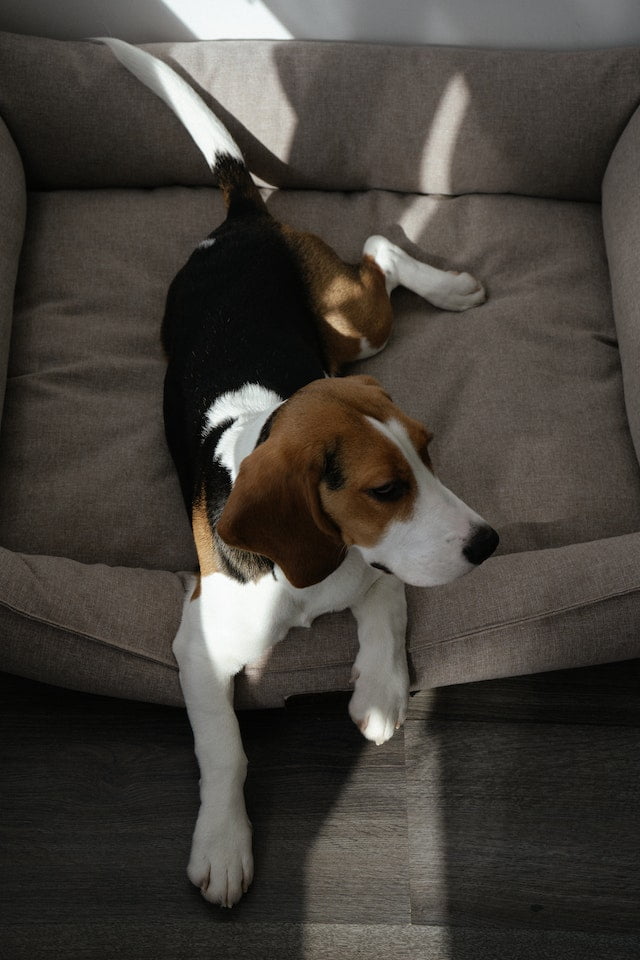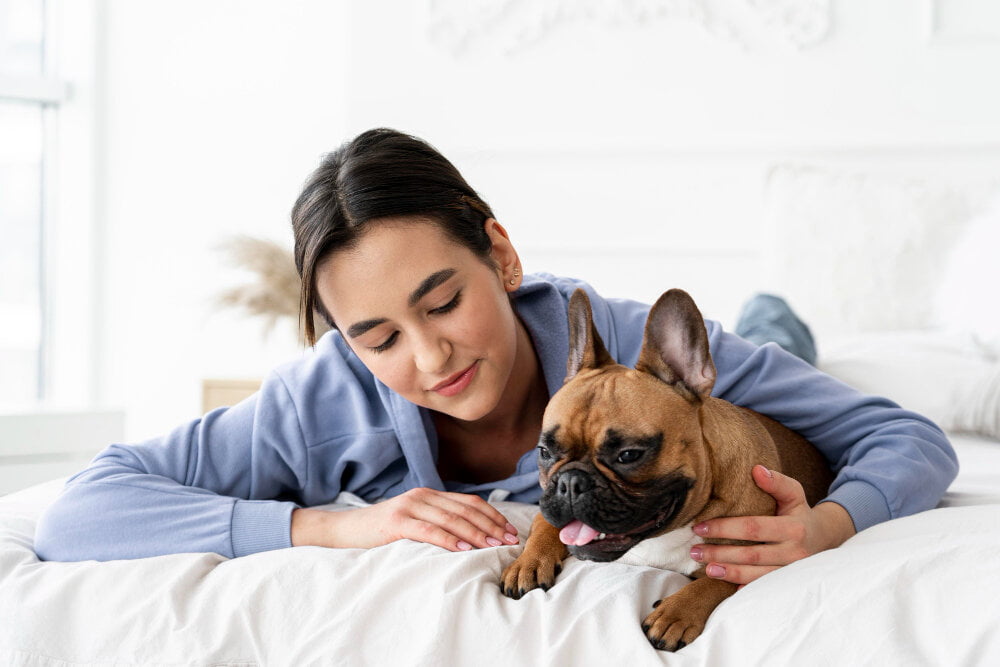How to Prepare your Home for a Puppy

Welcoming a new puppy into your home is an exciting time filled with joy and anticipation. As you eagerly await the arrival of your puppy into your home, it’s essential to ensure your home is ready to provide a safe, loving, and nurturing environment. Proper preparation will set the stage for a smooth transition and help your puppy adjust to their new surroundings. In this Pawsitive Guide, we’ll walk you through the essential steps to prepare your home for a puppy, from puppy-proofing your living spaces to building a strong bond with your new canine friend.
How to Prepare Your Home for a Puppy
Let’s check out the steps to prepare your home for the arrival of a new puppy.
1. Puppy-Proofing your Home
Just like baby-proofing for infants, puppy-proofing is crucial to ensuring your home is a safe haven for your new four-legged friend. Start by identifying potential hazards around your home, such as loose cords, small objects, and toxic substances. Remove or secure these items to prevent accidents. Check out the full tips on how to puppy-proof your home.
2. Creating a Safe Space for Your Puppy
Designate a specific area in your home for your puppy, like a cozy corner or a small room. This will serve as their safe space, providing a sense of security and comfort. Choose a suitable crate or bed where they can retreat to when they need some rest. Additionally, provide them with toys and entertainment to keep them mentally stimulated and engaged.
3. House Training and Potty Area
Housetraining is an essential aspect of preparing for a puppy. Establish a consistent schedule for feeding, bathroom breaks, and playtime. Designate a specific outdoor area as their potty spot and reward them with praise and treats when they eliminate in the right place. Puppies will have accidents, so be prepared to clean them up. It’s a good idea to have puppy pads on hand for when you can’t supervise your puppy. Positive reinforcement and patience are keys to successful housetraining.
Meanwhile, check out the comprehensive guide on how to potty train a Labradoodle puppy or any other breed
4. Feeding and Nutrition
In order for your new puppy to develop and grow in good health, you should endeavor to select the right food for him. Based on our experience, we recommend stocking up your house with the Wellness Complete Health Dry Puppy Food with Grains. This puppy-focused dry food has one of the best ratings on Amazon, and over 3,000 dog owners have purchased the pet food within the last 30 days. At least, this proves that the pet food is really living up to the hype and is one of the best on the market.
However, if you are in doubt about the right dog food for your new puppy, we recommend you consult with your veterinarian to determine the appropriate diet based on their age, breed, and any specific dietary needs. Also, establish a regular feeding schedule and monitor your new puppy’s water intake to ensure he stays hydrated.
5. Start Socialization and Training Early
Socializing your puppy is vital for their overall well-being. Introduce them to new experiences, people, and other animals in a controlled and positive manner. If you have other pets at home, let them sniff each other and get used to each other’s presence. Don’t force them to interact if they’re not comfortable.
Basic obedience training should also be initiated early on to teach them essential commands and proper behavior. Try to utilize positive reinforcement techniques to encourage good behavior and build a strong bond with your puppy.
6. Regular Grooming Routines and Health Care
Regular grooming routines are essential to maintaining your puppy’s hygiene and overall health. Brush his coat regularly, trim his nails, and clean his ears as needed. Schedule regular veterinary checkups for vaccinations, deworming, and general health assessments. Consult with your vet about parasite prevention methods suitable for your area.
7. Provide Time for Exercise and Playtime
Puppies have lots of energy and need regular exercise to stay happy and healthy. Provide them with opportunities for physical activity, such as daily walks, interactive play sessions, and games of fetch. Strike a balance between exercise and rest to prevent exhaustion and promote proper growth.
8. Building a Bond with Your Puppy
Developing a strong bond with your puppy is essential for lifelong companionship. Spend quality time with them, engaging in activities they enjoy. Show them love, patience, and understanding. Establish trust through consistent training and clear communication, and your puppy will reciprocate with unconditional love and loyalty.
9. Have fun!
Raising a puppy can be a lot of work, but it’s also a lot of fun. Enjoy this special time with your new puppy 🥰.
Conclusion
Preparing your home for a new puppy requires careful planning and consideration. By puppy-proofing your living spaces, establishing a safe and comfortable environment, and providing proper care and training, you set the stage for a happy and healthy life together. The love and companionship a well-prepared puppy brings into your home are truly rewarding.
Frequently Asked Questions
Where should a puppy sleep the first night?
Your new puppy should sleep in a crate in your bedroom on their first night and through the first three weeks, if possible. This will help them feel secure and comfortable, and it will also make it easier for you to take them out to go to the bathroom during the night. You can put the crate next to your bed so that you can hear them if they cry or whine.
Here are some tips for making the crate a comfortable and safe place for your puppy:
- Put a soft bed or blanket in the crate.
- Give your puppy a toy or two to keep them company.
- Cover the crate with a blanket to make it feel more den-like.
- Don’t leave the crate in a drafty area.
- Take your puppy out to go to the bathroom before bed.
- If your puppy cries or whines, don’t let them out of the crate right away. Wait a few minutes, and then see if they settle down. If they don’t, take them out to go to the bathroom.
Do puppies need water at night?
Yes, puppies need access to water at night, just like they do during the day. Hydration is essential for their overall health and well-being. Puppies have smaller bladders and higher metabolic rates, so they may need to urinate more frequently, including at night. Providing them with fresh water throughout the day and night is important to prevent dehydration and ensure their comfort. However, it’s a good idea to monitor their water intake before bedtime to avoid excessive drinking, which could lead to accidents during the night.
How many times should you feed a puppy?
The number of times you should feed a puppy depends on their age and breed. Here is a general guideline:
- Puppies under 6 months old: 3–4 times per day
- Puppies 6–12 months old: 2-3 times per day
- Puppies over 12 months old: 1-2 times per day
It is important to feed your puppy high-quality puppy food that is appropriate for their age and breed. You should also follow the feeding instructions on the food label.
How often should dogs be bathed?
The frequency with which you should bathe your dog depends on a number of factors, including their breed, coat type, activity level, and skin condition. However, as a general rule of thumb, most dogs only need to be bathed every 2-3 months. Bathing your dog more often than this can strip away their natural oils, which can lead to dry, itchy skin.
Here are some additional factors to consider when determining how often to bathe your dog:
- Breed: Some breeds, such as Labrador Retrievers and Golden Retrievers, have thick coats that are more prone to matting and odor. These dogs may need to be bathed more often than other breeds.
- Coat type: Dogs with short, smooth coats typically need to be bathed less often than dogs with long, wiry coats.
- Activity level: Dogs that are very active and get dirty often may need to be bathed more often than dogs that are less active.
- Skin condition: If your dog has dry, itchy skin, you may need to bathe them less often or use a special moisturizing shampoo.
If you are unsure how often to bathe your dog, it is always best to consult with your veterinarian. They can help you determine the best bathing schedule for your individual dog’s needs.


